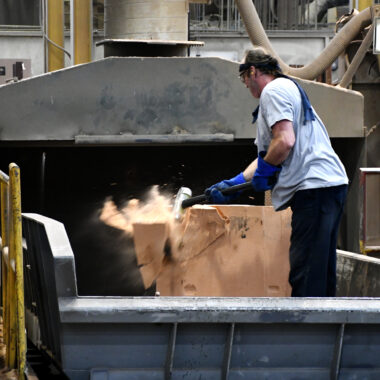Development Released: Improvements About Aluminum Casting
Development Released: Improvements About Aluminum Casting
Blog Article
Unlocking the Possible of Aluminum Spreading: Proven Methods for Success
Light weight aluminum casting has long been identified for its versatility and extensive applications throughout numerous industries. Join us as we discover the important aspects that can thrust aluminum casting towards exceptional success in today's affordable market landscape.
Advantages of Aluminum Casting
Aluminum spreading provides a wide variety of advantages that make it a favored choice in numerous industrial applications. One of the primary benefits of aluminum spreading is its lightweight nature, which contributes to fuel efficiency in industries such as automobile and aerospace. Additionally, aluminum is extremely flexible, permitting for detailed and intricate forms to be quickly created via spreading processes. This adaptability in design is a considerable benefit for sectors that need elements with particular geometries.
Additionally, light weight aluminum casting offers excellent deterioration resistance, making it excellent for applications where direct exposure to severe environments is a problem. The material additionally displays good thermal conductivity, which is valuable for markets requiring warmth dissipation, such as electronics (about aluminum casting). In addition, light weight aluminum is fully recyclable, straightening with the growing focus on sustainable techniques in contemporary production.
Layout Considerations for Casting
The style stage plays a crucial function in the total success of an aluminum casting project. One crucial factor to consider is the option of appropriate geometries and functions that assist in the spreading procedure.
Furthermore, considerations connected to parting lines, gating systems, and risers are important to protect against defects like porosity and contraction. It is essential to enhance the style for effective material usage and reduce post-processing demands. Simulations and prototyping can be important devices in improving the spreading and examining style prior to full-scale production.
Cooperation in between layout producers, factories, and engineers is essential to deal with any prospective challenges early in the design stage. By integrating these considerations into the spreading design procedure, suppliers can boost product quality, decrease expenses, and eventually open the full potential of light weight aluminum casting.
Enhancing Casting Effectiveness
When aiming to boost casting efficiency in light weight aluminum casting jobs,Creating with a focus on enhancing product flow and decreasing problems is crucial. To achieve this, using simulation software can assist in determining prospective concerns before the casting procedure starts. By simulating the flow of liquified light weight aluminum, designers can change gating and riser layouts to guarantee appropriate dental filling and solidification, inevitably decreasing the incident of defects such as porosity or contraction.
Furthermore, carrying out correct warmth treatment processes can improve the general spreading performance. Heat treatment can help enhance the mechanical properties of the aluminum casting, guaranteeing that the final element satisfies the needed requirements. In addition, using automation and robotics in the spreading procedure can simplify manufacturing, reduce hands-on labor, and boost general effectiveness.
Additionally, constant tracking and high quality control during the casting process are essential for identifying any discrepancies and guaranteeing that the last products meet the preferred requirements. By carrying out these approaches, makers can enhance casting performance, improve item quality, and ultimately achieve better success in light weight aluminum spreading projects.
Quality Control in Light Weight Aluminum Spreading

Efficient top quality control techniques play a crucial duty in making certain the accuracy and dependability of aluminum casting procedures. Quality control procedures in light weight aluminum casting encompass an array of tasks aimed at supporting specific criteria and recognizing variances that could compromise the last product.
In enhancement to process control, high quality control in light weight aluminum spreading involves extensive screening and inspection procedures at different phases of production. By executing robust top quality control techniques, aluminum casting facilities can provide items that fulfill customer expectations for performance, reliability, and high quality.
Making Best Use Of Profitability
To achieve optimal financial performance, an extensive technique for making best use of success within light weight aluminum spreading procedures should be meticulously devised and executed. One vital facet of making best use of profitability in aluminum spreading is maximizing manufacturing effectiveness. This includes enhancing processes, go to my blog decreasing waste, and reducing downtime to guarantee that resources are made use of properly. Carrying out lean manufacturing principles can aid recognize areas for improvement and boost total operational efficiency.

Moreover, branching out product offerings and exploring new markets can aid increase profits streams. Comprehending customer needs and market fads can lead calculated decisions to profit from emerging possibilities. Purchasing r & d to introduce items or processes can likewise drive profitability via distinction and customer complete satisfaction.
Conclusion
To conclude, aluminum spreading uses various advantages in regards to design adaptability, cost-effectiveness, and longevity. By carefully thinking about design considerations, boosting casting effectiveness, applying quality assurance actions, and optimizing profitability, makers can open the full possibility of aluminum Bonuses casting. This trustworthy and versatile process has actually confirmed to be a successful choice for see a variety of industrial applications.
Furthermore, light weight aluminum is highly malleable, permitting for complicated and detailed shapes to be quickly created via spreading processes.Efficient high quality control methods play a crucial role in guaranteeing the precision and dependability of light weight aluminum spreading procedures.In enhancement to procedure control, quality control in aluminum casting involves extensive testing and assessment treatments at different phases of manufacturing. By applying durable top quality control techniques, light weight aluminum spreading centers can supply items that satisfy client assumptions for high quality, dependability, and efficiency.
By very carefully considering design considerations, boosting casting performance, carrying out high quality control steps, and optimizing earnings, producers can unlock the complete capacity of aluminum spreading.
Report this page